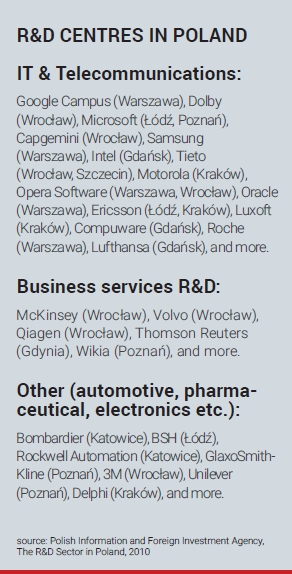R&D&I: Poland in innovation race

Editor

related articles
R&D explained
Research & Development (R&D, in Polish often referred to as B+R, Badania + Rozwój) has emerged as a separate sector of business in the recent decades. While autonomous work of stereotypically mad scientists has often been disregarded, overlooked or exploited, businessmen of the past could not reach their full potential for their lack of access to scientific thought. R&D helps connect those two
worlds by working to increase the amount of knowledge and new solutions, which result in innovative products: processes or technologies that advance the economic growth of Poland.
More and more often, R&D is accompanied by yet another letter in this acronym, constituting together R&D&I, with the last I standing for innovation. Polish authorities saw the necessity to incorporate innovative solutions into all aspects of public life, so that it affects education, science and eventually, economy. Although Poland is still on its way to realising these ambitions (according to the European Innovation Scoreboard it was considered a moderate innovator in 2017), it is striving to realise its full potential. There is a lot of place for improvement, but the main ambition is to lead the way in as many areas as possible.
A huge part of these activities was propelled by the EU and pre-established common goals for member states. Its initiative called 2014-2020 A New Perspective For Innovation In Europe is already far along. By the end of the programme Poland is supposed to have spent 1.7 per cent of its GDP on R&D&I. How is it working towards this goal?
R&D&I components
Saying that innovation is ensured by merging science and business is not enough to give the full picture of this sector in Poland. The landscape would not be complete without the more academic side of it, which is represented by scientific institutions, such as the Polish Academy of Sciences, tertiary education facilities conducting R&D activities or units providing services to them, namely libraries, archives, laboratories. All of these ventures need to be supported by the government – in Poland through systematically growing subventions for such projects – and thus serve as innovation hubs.
To balance the equation, however, there needs to be entrepreneurial cooperation between the aforementioned institutions and business. The government may try to woo investors holding innovative ideas with tax reliefs for companies conducting R&D projects. There are also special economic zones designed to encourage all sorts of investment, but usually it is R&D companies that constitute a significant
part of such ventures. Nevertheless, Polish innovation would be non-existent were it not for human resources that make it grow and expand day by day.
Innovation in enterprises in Poland
In order for the whole country to thrive and indulge in the newest solutions, it is important for single organisations to take interest in them as well. In 2016 Deloitte published their report reviewing the advancement of R&D mindset in enterprises located in Poland and further out in the region. It proved that although more and more companies decide to spend over 10 per cent of their budget on researching new solutions, there is still a tough road ahead for innovation in Poland-based enterprises. Almost one in three companies declared spending zero to very little money on R&D&I, assuming (usually wrongly) that activities of this kind do not fall into their business profile. Another potential discouragement for companies to engage in innovative projects is lack of precise rules for government subsidies and tax reliefs as well as bureaucracy. Investing in R&D seems risky as the state did not appoint any specific institutions to guide entrepreneurs in dealing with business incentives and thus potential benefactors are not sure if tax reliefs will apply in their specific case. These two problems discovered by the report show that such simple solutions as providing proper information and promoting R&D&I could possibly improve the state of Polish innovation.

On the positive note, there is a constant drop in the number of companies based in Poland that do not intend to engage in any sort of R&D activities whatsoever (only 2 per cent). What is more, over 80 per cent of them declare maintaining the same amount of expenditure or even increasing the amount of money spent on R&D&I – with this more conscious attitude Poland is on the right path to achieving its 2020 goal and seizing the opportunities arising on its horizon.
Investors breed innovation
Poland’s progress in the field of innovation can be stimulated not only by state aid or European funds, but also by private foreign investors locating their R&D centres in the country. Next to BPO, SSC or IT facilities, it is R&D that constitutes one of the most
major components of the Polish business landscape. According to the Crido Taxand report on R&D Market in Poland, only in 2015 there were 532 Research & Development centres (RDC) with foreign capital, along with several dozens of such centres established by Polish companies.
The trend among big corporations to open their research facilities in Poland is understandable. Poland provides a favourable business environment and qualified staff comprising of scientists, engineers and analysts willing to take part in innovative projects. This is why a variety of companies has decided to give Poland a shot, since it allows for cooperation with startups, complementary companies and Polish educational facilities. Their scope of activities focuses mostly on development and commercial release of new products, patent protection for inventions, and intrapreneurship, meaning the development of employee initiatives (Crido Taxand 2015 R&D Market in Poland).
Who bet on Poland? (see the table on the right)
Despite some difficulties described above (unclear legal requirements for subsidies and projected slowdown in R&D funding growth), the number of big R&D businesses springing up in Poland is on the rise. The list of companies that bet on Poland is long and constantly expanding, falling into different categories of R&D centres operating in the country.
Having seen the potential of the R&D&I sector in Poland, it may be your turn to join one of the projects in this field. As soon as Polish legislation becomes better suited to the market and its needs, the cooperation between business, academia and commerce is bound to flourish even further. Thanks to that, Poland can become a new hotbed for all innovators.













